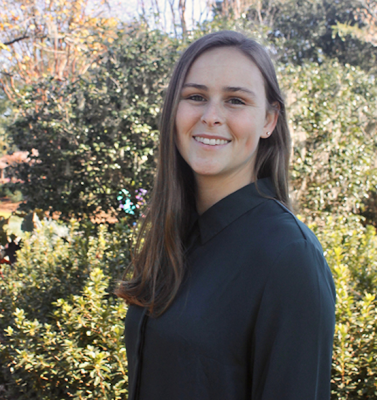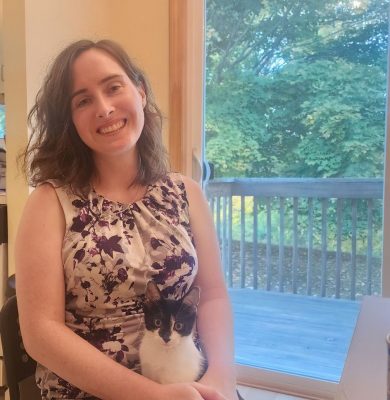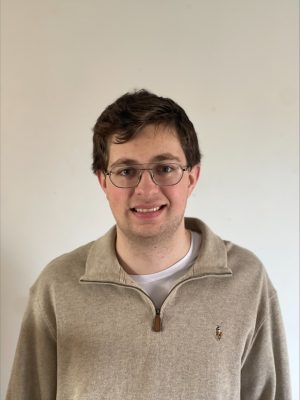SEE Lab
Faculty Advisors
Dr. Kerry L. Marsh
she

Kerry Marsh is a Professor of Psychological Sciences who supervises graduate students in the Social program, and occasionally in PAC. Although trained to study motivated cognition and attitude functions, she has increasingly moved toward studying and advocating for a more radically embodied and embedded approach to social psychology by taking a Gibsonian ecological approach to social perception and to joint action. She has developed novel ways of examining the emergence of interpersonal synergies – examining how individuals in rocking chairs are pulled to synchronize their chair movement as a function of seeing or hearing others’ rocking (and how music affects such sync) – and cooperative action, in addition to a variety of human-environment-technology issues such as the role of social influence processes during emergency evacuation of virtual buildings and how drivers within a semiautonomous car (AV) and those outside of the vehicle (pedestrians and nonAV drivers) coordinate action with AVs.
Contact: Kerry.L.Marsh@uconn.edu
Dr. Alexandra Paxton
she/her

Alexandra Paxton is an Assistant Professor of Psychological Sciences in the Perception, Action, Cognition Division. (She is also affiliated with the Center for the Ecological Study of Perception and Action; the Institute for Collaboration on Health, Intervention, and Policy; and the Connecticut Institute for the Brain and Cognitive Sciences.) She takes a data-rich approach to understanding how people collaborate, bond, and fight. To do that, she weaves together a variety of data sources from the lab and the real world for a converging tapestry of the many ways in which language, movement, decisions, and emotions change during social contact. Understanding how context—including conversational goals, social connections, and physical spaces—shapes emerging behaviors is a primary goal of her research, embedded within rich traditions of dynamical and ecological perspectives on human behavior and cognition broadly.
She is also interested in developing methods to quantify social interaction, promoting open science research and education, and creating opportunities for cognitive scientists and psychologists who are interested in big data, naturally occurring data, and data science, with a special focus on data ethics.
Contact: alexandra.paxton@uconn.edu
Graduate Students
Caitrín Hall
she/her
Program: PAC-Eco
Caitrín uses nonlinear methods to study interpersonal dynamics, with an interest in group synchrony and social connectedness. Her work explores how synchronizing with others impacts physiological and self-reported health outcomes in various settings. Currently, she is studying this in the context of yoga and mindfulness practices.
Contact: caitrin.hall@uconn.edu
Alexa Ott
she/her

Program: Social
Alexa's research centers on the person-environment relationship in a variety of contexts. Her work has explored the extent to which affective states or built vs. natural environments may influence one's possibilities for action as well as prototypicality and climate change attitudes. Currently, she is interested in investigating behavioral outcomes associated with the presence or absence of identity safety cues (ISCs).
Contact: alexa.ott@uconn.edu
Lucia Rivas
she/her
Program: PAC-Eco
My interests lie in the intersectionality of humans' identities and the way their sense of self, affiliations, and social roles affect how they relate to each other and their environment. I plan to investigate how people resolve conflict and manage expectations through communication to achieve desired relationship outcomes in specific situational contexts.
Contact: lucia.rivas@uconn.edu
Gray Thomas
he/him
Program: PAC-Eco
Broadly, Gray's work aims to understand how one moves through the world by applying an ecological framework to several domains. This is evident in his work on prospective memory, interpersonal synchrony during conflict, dynamics of misinformation, habit formation, values-realizing theory, and skills training in a sports context. He is currently a Skills Acquisition Research Fellow with the Oklahoma City Thunder.
Contact: gray.ft@uconn.edu
Emma Wedell
she/her

Program: Social
Emma's cross-disciplinary research interest s broadly pertain to equity at multiple levels: individual (e.g., substance use & other mental health disparities), interpersonal (e.g., intergroup dialogue), and structural (e.g., confrontation of institutional discrimination). In some of her current collaborations she seeks to investigate these topics via a dynamical systems approach.
Contact: emma.wedell@uconn.edu
Undergraduate Students
James Fitzpatrick
he/him

Major: Psychology and English
Insert a short description of your research interests.
James Fitzpatrick is a fourth-year undergraduate in the Dyscord Lab. Within the lab, he assists in multiple studies looking at how people interact in dyads and connect with each other and the environment on a larger scale. He aspires to obtain a Master's degree in Clinical Mental Health Counseling and eventually open his own therapy practice.
James Fitzpatrick
he/him
Major: ?
Insert a short description of your research interests.
James Fitzpatrick
he/him
Major: ?
Insert a short description of your research interests.
James Fitzpatrick
he/him
Major: ?
Insert a short description of your research interests.
Visit Psychological Sciences Graduate Homepage
Lab Alumni & Affiliates
Faculty
Dr. Bert Hodges
Dr. Laura S. Cuijpers
Doctoral Students
Megan Chiovaro (2023)
Shu Jiang (2023)
Cassidy Burt (2022)
Ashley Dhaim (candidate)
Annette Tucker (2020)
Ben Meagher (2014)
Undergraduate Research Assistants
Myla Denson, Zohaa Chaudhary, Zanab Chaudhary, Camryn Ricard, Christina Bibinski, Brittany Burkman, Sarah Ferrigno, Jeffrey Glassman, Seo Young Oh